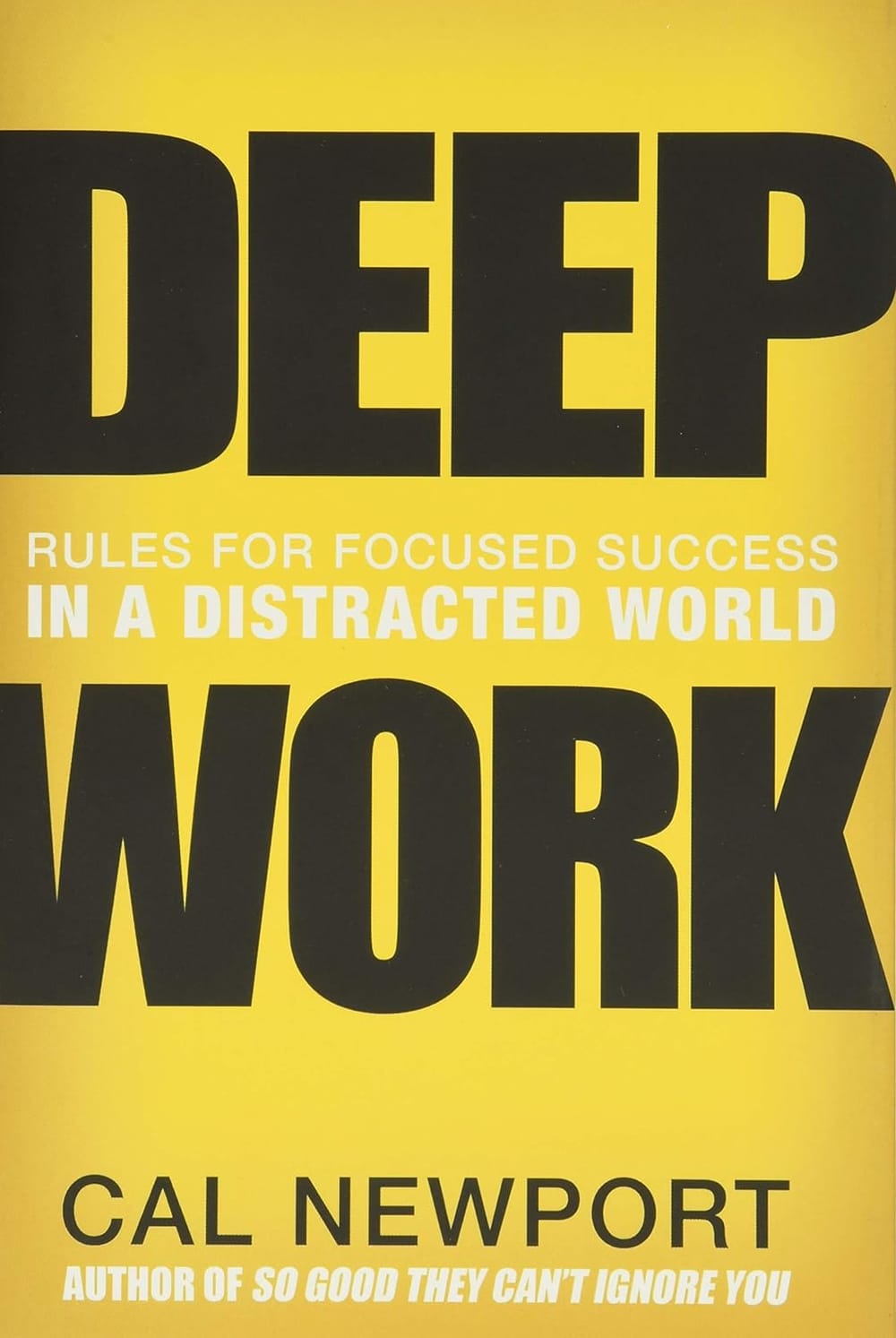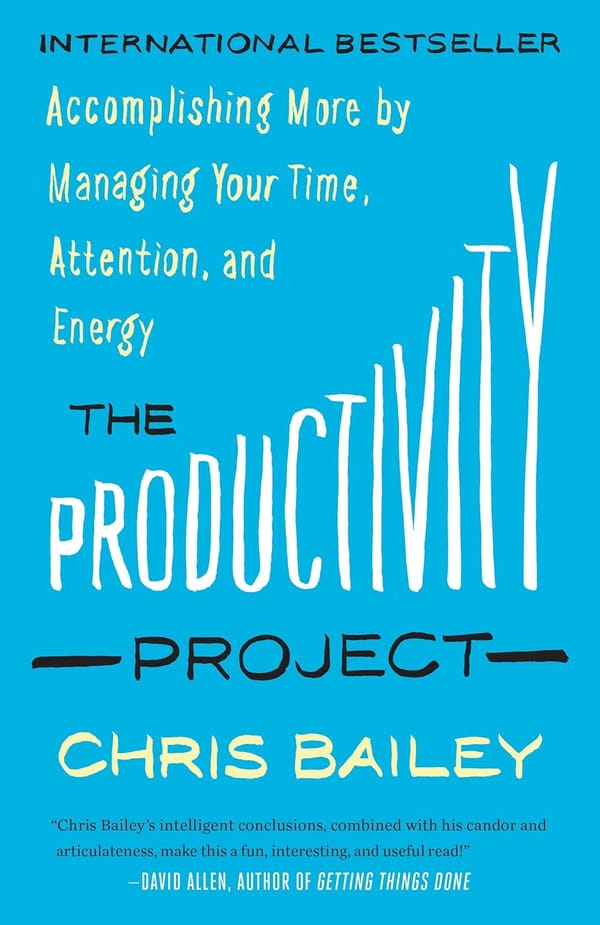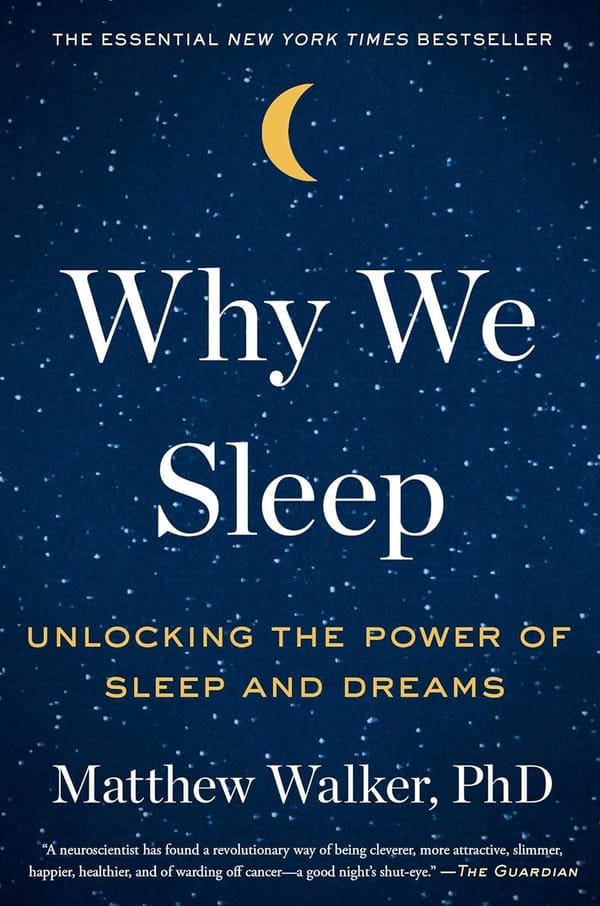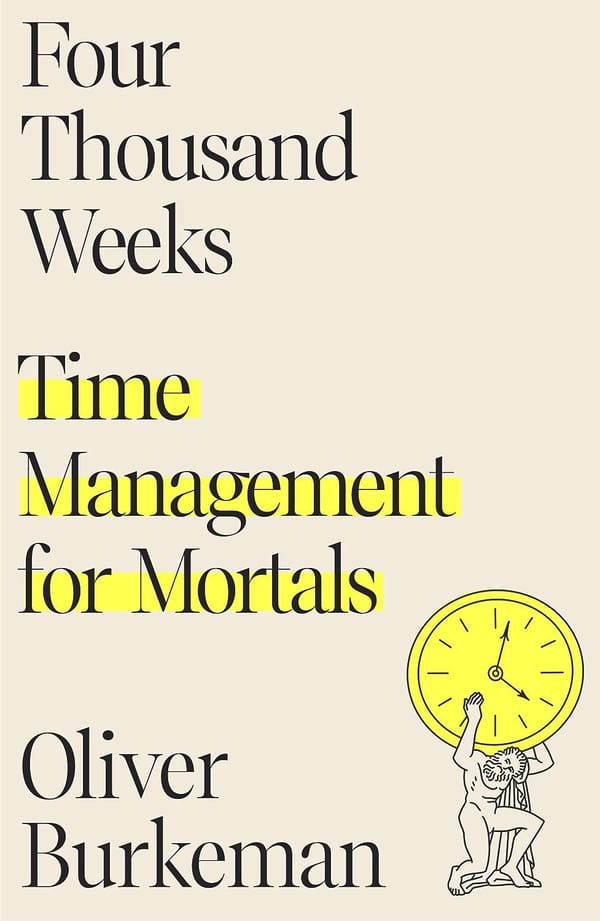Deep Work - Book Notes
If you enjoyed my review, consider supporting me by using the affiliate links below to purchase the book. Your kindness fuels my passion for sharing captivating reads with you!
🚀 The Book in 3 Sentences
- "Deep Work" by Cal Newport advocates for the cultivation of deep work skills, emphasizing its increasing rarity and value in today's economy.
- Newport explores strategies to integrate deep work into one's routine, such as adopting specific philosophies, minimizing social media usage, and optimizing email management.
- The book encourages individuals to prioritize focused, distraction-free work sessions, evaluate the impact of technology on their lives, and implement practical habits to enhance concentration and productivity.
👱 Who Should Read it?
It is recommended for individuals who seek peak productivity in a world filled with distractions, especially knowledge workers looking to enhance their performance. The book is valuable for those struggling to maintain focus in an era of constant connectivity, providing actionable advice on minimizing shallow work and cultivating deep, concentrated efforts. It is also suitable for individuals seeking a balance between work and personal life, offering principles for optimizing work hours and minimizing distractions. Additionally, leaders and managers can gain insights into fostering a work culture that values deep work and supports high-quality, focused output. Overall, the book is beneficial for anyone interested in optimizing cognitive abilities and navigating the challenges of a hyper-connected world.
🍀 How the Book Changed Me
It made me realize how much time I spend on shallow work, notifications and other unnecessary distractions. After reading the book I started to disable notifications for most apps on my phone, and started to block a few hours a day in my calendar at work to focus on important topics that require deep work.
✍️ Top 3 Quotes
- "Deep work is key to extracting meaning from your profession."
- "Don't take breaks from Distraction. Instead take breaks from Focus."
- "What we choose to focus on and what we choose to ignore - plays in defining the quality of our life."
🔨 3 Action Points
- Establish a Deep Work Routine:
Choose a deep work philosophy that aligns with your lifestyle, whether it's monastic, bimodal, rhythmic, or journalistic. Specify a dedicated location and duration for deep work sessions, and set clear rules during these sessions, such as no internet or specific productivity targets. - Evaluate and Minimize Social Media Use:
Conduct a thorough assessment of the impact of social media on your professional and personal life. Identify the core factors that determine success and happiness, and adopt social media tools only if their positive impacts substantially outweigh the negatives. Consider a 30-day social media detox and evaluate whether the absence of these platforms significantly improves your life. - Optimize Email Management:
Schedule specific times during the day to check and respond to emails, avoiding constant interruptions. Implement strategies to control emails, such as making the sender do more work and crafting efficient responses. Establish a clear boundary between work and personal time by implementing a shutdown ritual after finishing work, which includes avoiding email checks in the evening.
📗 Summary & Notes
The Value of Deep Work
Deep Work Hypothesis:
The hypothesis suggests that as our economy evolves, the ability to perform deep work becomes increasingly rare and valuable. Those who make deep work a core aspect of their professional lives will thrive.
Groups Benefiting from Intelligent Machines:
Newport identifies three groups benefiting from intelligent machines: high-skilled workers with skills difficult to replace, superstars whose talents become universally accessible, and owners with access to capital investing in technological advances.
Core Skills in the Knowledge Economy:
To succeed in the knowledge economy, Newport emphasizes the importance of learning hard things quickly and producing at an elite level, both of which are achieved through the practice of deep work.
High-Quality Work Formula:
Newport introduces the formula: High-Quality Work Produced = (Time Spent) x (Intensity of Focus), highlighting the critical role of deep, focused effort in producing high-quality work.
Rarity of Deep Work:
Business Trends Against Deep Work:
Newport identifies common business trends like open-space offices, instant messaging, and a strong social media presence as factors that hinder deep work. These trends often prioritize immediate connectivity over focused, concentrated effort.
Principle of Least Resistance:
The principle suggests that in a business setting, individuals tend to choose the path of least resistance. Without clear feedback on the impact of behaviors on the bottom line, people are inclined towards activities that are easier in the moment.
Example: Our culture of connectivity makes it easier, because it makes it acceptable to work out of our inbox, instead of thinking about what to do next.
Busyness as a Proxy for Productivity:
In the absence of clear indicators of productivity, knowledge workers often resort to visible busyness as a measure of their value. This may involve quick responses to emails or attending numerous meetings, but it may not necessarily contribute to meaningful output. The problem is, that it's difficult to measure the costs or the negative impact of these activities.
The Cult of the Internet:
Newport critiques the uncritical acceptance of technological advances, arguing that many of these advancements, particularly in the form of social media and constant connectivity, serve as distractions that hinder deep work.
Meaningfulness of Deep Work:
Neurological Argument for Depth:
Deep work allows individuals to wire their brains to react to positive imagery, reducing attention to irrelevant issues. By focusing on something important, there is less mental energy available to dwell on negative aspects.
Psychological Argument for Depth:
Deep work leads to a state of flow, where individuals are fully immersed and engaged in an activity. This state of deep concentration contributes to higher satisfaction and enjoyment in one's work.
Philosophical Argument for Depth:
Craftsmanship, often associated with deep work, is portrayed as a source of meaning in one's life. The commitment to deep work is essential for extracting meaning from one's profession.
Finite Willpower and Attention:
Newport discusses the finite nature of willpower and attention, likening them to batteries that deplete with use. To optimize these resources, individuals should create an environment that reduces the need to use willpower.
Strategies for Deep Work:
Depth Philosophies:
Newport presents different philosophies such as monastic, bimodal, rhythmic, and journalistic to incorporate deep work into one's schedule. Each philosophy offers a unique approach to balancing deep work with other obligations.
- Monastic Philosophy: Eliminate or minimize shallow obligations. Only works for a small group of professions which have "only" one thing to do like e.g. book authors.
- Bimodal Philosophy: Divide your time into one part for deep work and one for everything else. In the deep work part you act the same way as the monastic philosophy. Deep work phase should be at least a full day. Often used by people who are dependent on shallow work as well to live, as most people are.
- Rhythmic Philosophy: Create a fixed schedule on when you do deep work to avoid even the simplest scheduling decisions as this reduces the barrier. You can't get as deep as with the bimodal philosophy, however it fits more into the reality of a "normal life". Most people don't have the freedom to be off for days for deep work in their jobs.
- Journalistic Philosophy: Fit deep work wherever you can in your schedule. This only works for experienced deep workers, to switch from shallow to deep work. It also requires that you know that what you want to achieve is important and you will succeed.
Habits to Reduce Friction:
Practical habits, like specifying a location and duration for deep work, setting rules, and supporting the brain with essentials like coffee, are suggested to reduce friction and make it easier to engage in deep work consistently.
Grand Gestures to Increase Motivation:
Making significant changes to one's environment, termed as "grand gestures," is proposed to increase motivation for deep work by enhancing the perceived importance of the task. E.g. booking an expensive hotel room to work on the next chapter of your book.
Balancing Deep Work and Serendipitous Creativity:
Newport advises on maintaining a balance between deep work and open spaces for creativity. It is crucial to separate the two modes of work to optimize productivity.
Being Lazy to Foster Deep Work:
Allowing the mind time for idleness after work hours is emphasized. This downtime helps replenish energy and motivation for deep work, making it more sustainable.
Shutdown from Work:
Creating a shutdown ritual at the end of the workday, which involves actively disengaging from work-related thoughts, helps ensure a clear separation between work and personal life.
Embracing Boredom:
Deep Work Needs Training:
Concentration is considered a trainable skill, and individuals are encouraged to train their brains to resist distractions outside of deep work sessions. Constantly checking phones during idle moments is discouraged as it can hinder concentration.
Taking Breaks from Focus:
Newport advises taking breaks from focus, not distraction. Scheduled times for internet use are recommended, and individuals are encouraged to resist the temptation to constantly check online platforms.
Roosevelt Dashes and Productive Meditation:
Techniques like Roosevelt Dashes (setting extreme deadlines) and productive meditation (thinking deeply during physical activities) are suggested to enhance deep work abilities and improve concentration.
How to Memorize a Deck of Cards:
Training memory is proposed as a means to improve concentration and focus. Newport provides a method for memorizing a deck of cards as an illustration of memory-enhancing exercises.
- Imagine walking through 5 rooms in your house.
- Imagine 10 things (the bigger the better) in each room and the order you look at them.
- Connect each card in a deck to a memorable person or a special item, best with an association (e.g. Donald Trump for King diamonds because he is rich), practice this connection until you can randomly pick a card from a deck and name the associated person/thing immediately.
- Now when memorizing the deck, connect the person to the item in the room, e.g. Donald Trump putting his shoes in the cabinet.
Quit Social Media:
Evaluate Social Media Use:
Individuals are encouraged to critically evaluate the impact of social media on their professional and personal lives. The focus is on adopting a craftsman approach to tool selection, only using tools that substantially contribute to positive outcomes.
Focus on Vital Few Activities:
Prioritizing activities with substantial positive impacts on goals is emphasized. This involves focusing on the "vital few" instead of spreading attention across less important activities.
How to Quit Social Media:
A 30-day social media detox is recommended, followed by evaluating the impact of each platform. If the answer is negative for both questions ("Would the last 30 days have been notably better if I had been able to use this service?" and "Did people care that I wasn't using this service?"), quitting the platform is advised.
Deliberate Leisure Time:
Newport encourages individuals to actively plan their leisure time, avoiding addictive sites that can steal attention and make it challenging to resist distraction when focusing on deep work.
Drain the Shallows:
Reduce Shallow Work:
Rather than completely eliminating shallow work, Newport advocates minimizing it to create more room for deep work. Shallow work is recognized as necessary but should not dominate one's schedule.
Schedule Every Minute of Your Day:
Newport introduces time blocking, where individuals divide their workday into blocks of at least 30 minutes, assigning specific tasks to each block. The goal is to have a plan for every minute of the day, though flexibility is allowed.
Quantify Depth and Shallow Work Budget:
Tasks are evaluated on a shallow-to-depth scale by asking, "How long would it take to train a smart recent college graduate with no specialized training in my field to complete this task?" Individuals are encouraged to set a shallow work budget with supervisor support to prioritize deep work.
Fix Your Work Schedule:
Having a fixed work schedule and sticking to it is recommended. This involves reducing shallow work and saying "no" to tasks that lead to many shallow obligations. Newport emphasizes not overexplaining why certain tasks cannot be undertaken to avoid unnecessary negotiations.
Tips to Control Email:
Strategies for controlling email include making the sender do more work, crafting thoughtful responses, not responding to vague emails, and scheduling specific times to check emails. The aim is to minimize the distraction caused by frequent email checking.



